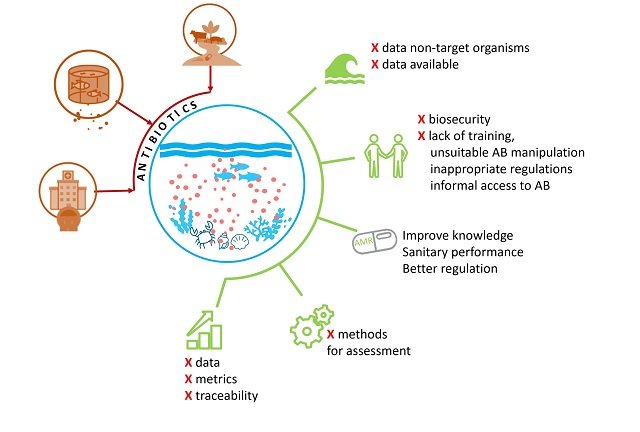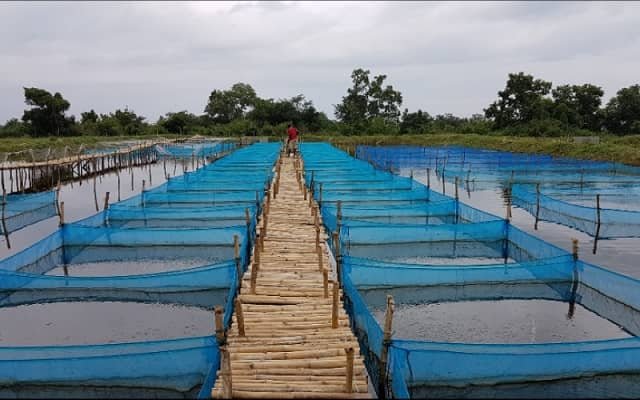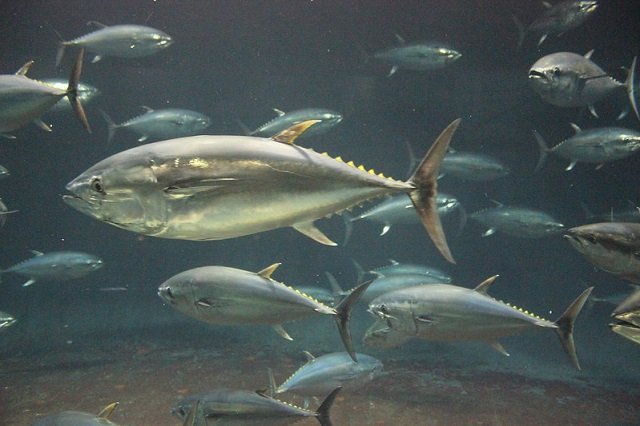
Global demand for fish and seafood is placing enormous pressure on aquaculture practices. While aquaculture offers a promising solution for food security, concerns related to the excessive and improper use of antibiotics threaten its sustainability. To address this pressing challenge, the Antimicrobial Assessment on Global Aquaculture Production (AGAP) workshops, sponsored by Monterey Bay Aquarium, brought together a collective of 56 experts from around the world.
In this context, researchers from the Monterey Bay Aquarium Global Oceans Conservation Program, the Universidad Santo Tomás, the Millennium Institute of Coastal Socio-Ecology, the University of Massachusetts Boston, Stockholm University, the Royal Swedish Academy of Sciences, Universidad Andrés Bello, and the Interdisciplinary Center for Aquaculture Research (INCAR) published the results of the AGAP initiative in the scientific journal Antibiotics.
The problem with antibiotics
Antibiotics are frequently used in aquaculture to prevent and treat diseases, but their excessive and improper use can have serious consequences. Overuse of antibiotics can lead to the development of antimicrobial resistance (AMR), making it harder to treat infections in humans and animals. Moreover, antibiotics can contaminate the environment, damaging aquatic ecosystems and potentially affecting human health.
The impact of antimicrobial resistance
Antimicrobial resistance is a major global health threat, and the World Health Organization (WHO) estimates it could cause economic losses of up to $1 trillion by 2050. When bacteria become resistant to antibiotics, infections can become harder and more expensive to treat, which could lead to increased mortality rates.
A collaborative approach to solving a global problem
This group of scientists embarked on a series of workshops aimed at fostering knowledge exchange and developing a roadmap for the responsible use of antibiotics in aquaculture. Their collaborative efforts focused on five key areas:
- Assessing the current landscape: Evaluating the existing knowledge base on antibiotic use in aquaculture was crucial to identifying gaps in understanding. This knowledge is essential to inform future research and intervention strategies.
- Measuring ecological impact: The workshops highlighted the need to establish ecologically relevant indicators to monitor the environmental impact of antibiotics used in aquaculture. Setting clear thresholds for these indicators will enable effective assessment and mitigation strategies.
- Socioeconomic factors and governance: Understanding the socioeconomic factors that influence antibiotic use in aquaculture is key to developing sustainable solutions. The workshops emphasized the need for strong, transparent regulatory frameworks to guide farmers and promote responsible practices.
- Antibiotic use and antimicrobial resistance: Unraveling the complex relationship between antibiotic use in aquaculture and the development of antimicrobial resistance (AMR) is crucial. This knowledge will inform strategies to minimize the emergence and spread of AMR.
- Universal monitoring tools: Developing standardized, universally applicable antibiotic monitoring tools is essential for the effective collection and analysis of data across regions and sectors. This will enable a more comprehensive understanding of antibiotic use patterns in aquaculture.**
Results and the path ahead
The AGAP workshops yielded valuable insights and paved the way for a more sustainable future for aquaculture. Key outcomes include:
- A roadmap for prioritizing research areas related to antibiotic use in aquaculture.
- Identification of the socioeconomic factors influencing antibiotic use behaviors.
- A call to strengthen regulatory frameworks to guide aquaculture farmers.
- An emphasis on training programs for aquaculture farmers on the responsible use of antibiotics.
- Greater access to veterinary expertise and extension services for education and support.
Collaboration for a sustainable future
The AGAP workshops serve as a testament to the power of collaboration in addressing complex global challenges. By bringing together experts from diverse disciplines, we can develop comprehensive solutions and ensure a future where aquaculture thrives alongside public and environmental health. However, recognizing limitations is crucial for continued progress. Expanding participation and incorporating diverse perspectives will enrich future discussions and ensure that all pertinent issues are addressed.
Sustainable aquaculture practices
To address the challenges posed by antibiotic use in aquaculture, it is essential to adopt sustainable practices. This includes:
- Reducing antibiotic use: Implementing preventive measures such as improved biosecurity, vaccination, alternatives to antibiotics, and selective breeding can help reduce the need for antibiotics.
- Promoting responsible antibiotic use: Educating aquaculture producers on the proper use and disposal of antibiotics is crucial.
- Developing alternative disease control methods: Research and development of alternative disease control methods, such as probiotics and phage therapy, can provide sustainable solutions.
- Enhancing surveillance and monitoring: Implementing robust surveillance and monitoring programs can help identify and address emerging threats of antimicrobial resistance.**
Conclusion
The excessive and improper use of antibiotics in aquaculture poses a significant threat to human and animal health. By adopting sustainable practices, promoting the responsible use of antibiotics, and fostering collaboration, we can mitigate the risks associated with antibiotic use and ensure a healthier future for aquaculture.
Stay Always Informed
Join our communities to instantly receive the most important news, reports, and analysis from the aquaculture industry.
Reference (open access)
Farías, D. R., Ibarra, R., Estévez, R. A., Tlusty, M. F., Nyberg, O., Troell, M., & Norden, W. (2024). Towards Sustainable Antibiotic Use in Aquaculture and Antimicrobial Resistance: Participatory Experts’ Overview and Recommendations. Antibiotics, 13(9), 887. https://doi.org/10.3390/antibiotics13090887
Editor at the digital magazine AquaHoy. He holds a degree in Aquaculture Biology from the National University of Santa (UNS) and a Master’s degree in Science and Innovation Management from the Polytechnic University of Valencia, with postgraduate diplomas in Business Innovation and Innovation Management. He possesses extensive experience in the aquaculture and fisheries sector, having led the Fisheries Innovation Unit of the National Program for Innovation in Fisheries and Aquaculture (PNIPA). He has served as a senior consultant in technology watch, an innovation project formulator and advisor, and a lecturer at UNS. He is a member of the Peruvian College of Biologists and was recognized by the World Aquaculture Society (WAS) in 2016 for his contribution to aquaculture.







